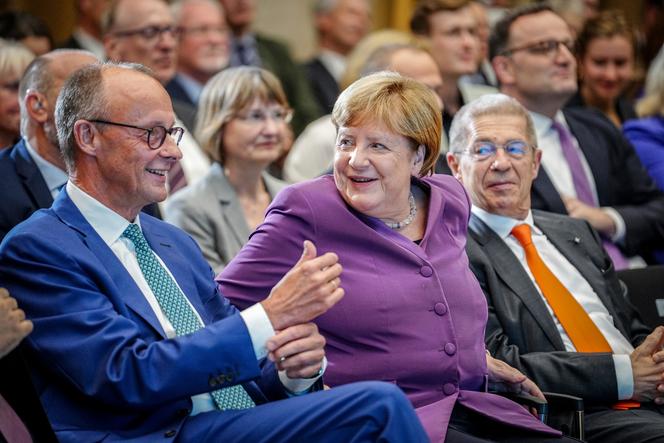

LETTER FROM BERLIN

Despite the numerous books written about Angela Merkel – around 15 to date – Germany is not yet done with her. After once adoring her, the country is now casting a much more critical eye on her 16 years in power. This includes her own party, the Christian Democratic Union (CDU), which celebrated her 70th birthday with great fanfare on September 25 under the arches of the Academy of Sciences in Berlin. The implicit roadmap for Friedrich Merz, the party's official candidate for the 2025 elections, who praised her that evening, is to break with her legacy.
Preempting the highly anticipated release of the former chancellor's memoirs, which will be published in over 30 countries on November 26, journalist Eckart Lohse of the Frankfurter Allgemeine Zeitung published a book (untranslated) last month. It offers the first critical assessment since her departure, focusing on a widely shared criticism in Germany: the absence of major reforms during her four terms in office.
While the world was transforming rapidly, Merkel sought to preserve the carefree contentment of a country satisfied with its power, the book claims. By sparing them potentially painful reforms, the chancellor aimed to impose "as few constraints as possible on her 80 million protégés," the author writes. This happened even as new threats loomed at the turn of the century: dependence on Russian gas, a blindness to Vladimir Putin's imperialist agenda, China's economic ambitions and underinvestment in defense as well as infrastructure, despite the challenges of ecological transition.
"The assessment drawn up shortly after the handover of power in Berlin is a rude awakening," said the author. "The Germans appreciated this sense of security in a troubling world. They thanked their chancellor, elected four times, for making them believe that this model was still relevant to everyday life." In 2021, when Merkel left office while Covid-19 continued to impose restrictions on global trade, Germany started to recognize the vulnerabilities in its model stemming from its various dependencies, especially on China for technology. The following year, its entire industry was shaken by the soaring energy prices caused by the embargo on Russian gas following the invasion of Ukraine. The country is still going through one of the most serious crises in its history, plunging the eurozone's economic engine into recession.
Merkel is not the only one to have made mistakes. The country has "willingly allowed itself to be fooled" in the face of these dangers, said Lohse. "It would be unfair to accuse Merkel of acting against the will of the voters. Or against the wishes of her own party, the CSU [Christian Social Union, CDU’s ally], or the SPD [Social Democratic Party]. On the contrary, she did what was expected of her. What promised approval. And what promised political survival in an environment that was hostile and unwelcoming to her from the start."
You have 49.02% of this article left to read. The rest is for subscribers only.
